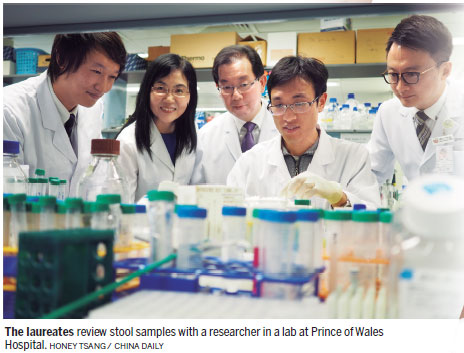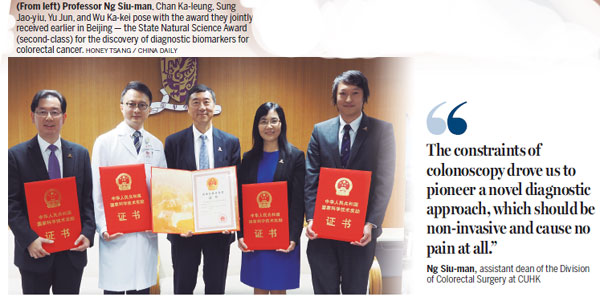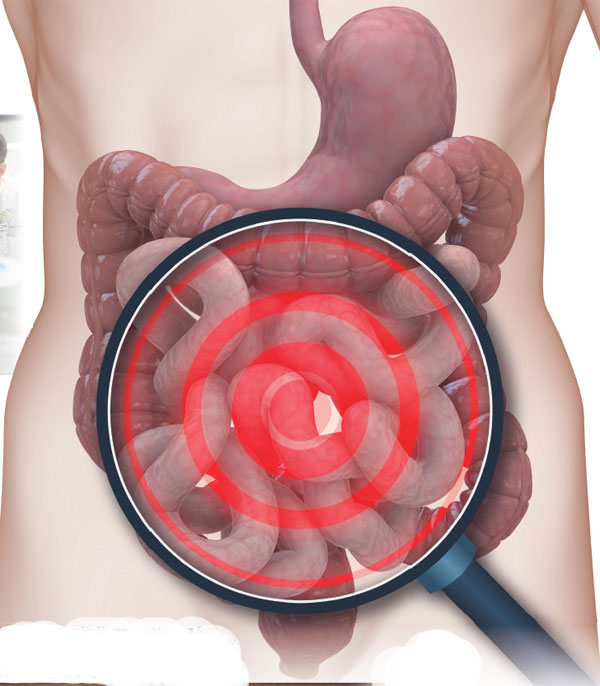Stalking a killer
Updated: 2017-01-25 10:16
By Honey Tsang(HK Edition)
|
|||||||||
Scientists?are?closing?in?on?colorectal cancer, a lethal form of?cancer that is more prevalent than any other in the city. Honey Tsang reports.
It's a cramped research lab at Prince of Wales Hospital. Freezers and testing tubes abound, with little space to walk. Over the past 15 years, veteran surgeons worked here, tirelessly analyzing scads of blood and stool samples. The effort led to a discovery of certain mutated genes that pointed right at colorectal cancer. In 2014, colorectal cancer, the most common of all the cancers in Hong Kong, took more than 2,000 lives. That year, 4,979 new cases were reported.
Earlier in 2016, four scientists, Sung Jao-yiu, Chan Ka-leung, Ng Siu-man and Yu Jun, who have been in and out the lab, shared the State Natural Science Award 2016 (second class) for discovering a low-cost, efficient, and non-invasive genetic test for colon cancer.
"Our team worked 24/7 in the lab, striving to scout out biomarkers in stool samples, that help catch colorectal cancer and its preceding precancerous polyps," said professor Chan, dean of the Gastroenterology & Hepatology Division at the Chinese University of Hong Kong (CUHK).
The biomarkers, discovered by the four laureates, are a series of altered microRNAs (miRNAs) and DNAs, taken either from colon polyps or malignant tumors. In the stool samples collected from patients, the levels of these biomarkers were higher in patients with colon polyps, and even higher when cancerous tumors were present.
The team's new finding shows great promise for detecting early colon cancer. It also provides great relief for those who shy away from colonoscopy - a routine medical examination in which a 1.3-meter long seeing tube is inserted along the rectum and colon to check for suspicious lumps in the intestines.
Eliminate the pain
Colonoscopies can be very unpleasant experience. The cost per each detection is high. And more, it involves hassles, including a compulsory liquid diet and intake of laxatives prior to the examination. These only add to the pain and other discomforts.
Ng Siu-man, assistant dean of the Division of Colorectal Surgery at CUHK, pointed out that even colonoscopies may not catch all the polyps in the colon. It is an invasive approach that bears some risks, like perforation of the walls of the colon, or bleeding.
"The constraints of colonoscopy drove us to pioneer a novel diagnostic approach, which should be non-invasive and cause no pain at all," said Ng.
The biomarker-based test, which the team considers as a no-fuss, new method for detecting colon cancer, is not only inexpensive, but also clinically proven to be precise. All it needs is a faecal sample from the subject, the team said.
"Oftentimes, the polyp and cancerous cells fall off the inner lining of the colon, which go into the faeces and are expelled. This just explains why our team looks over stool samples for the presence of altered miRNAs," said Sung Jao-yiu, vice-chancellor of CUHK, who has been at the helm of the colon cancer research project for over a decade.
The first biomarker found to be connected to colorectal cancer was miRNA-92. In both polyps and cancer cells, higher levels of miRNA-92 were found.
The discovery was made in 2009. The success rate for identifying early colon cancer, where miRNA-92 is found at elevated levels, reaches up to 89 percent through checking stool samples.
In the years since, the team has ferreted out more biomarkers, such as miRNA-135b, miRNA-221, and miRNA-34a. The list keeps growing.
One of the important functions of miRNA lies in tumor suppressor genes - a natural defense mechanism which inhibits the formation of cancerous cells in the body. "Once the RNAs become altered, so do the genes. The changes taking place form the triggers for the onset of colorectal cancer," Sung elucidated when asked about why miRNA is a viable indicator for colon cancer.
Not yet perfect
In Hong Kong, colorectal cancer was the second deadliest cancer after lung cancer in 2014. It is asymptomatic in its early stages. In many instances, colon cancer patients are unaware they have a problem, until the cancer has metastasized and spread to other parts of the body. Colorectal cancer ranks fourth, around the globe, among the most common cancer-related deaths, according to World Health Organization.
In September 2016, the HKSAR introduced the city's first ever Colorectal Cancer Screening Pilot Programme. The three-year pilot scheme aimed at reducing colorectal cancer, noting that there is a compelling need.
Elderly people, born between 1946 and 1955, are eligible to join the scheme. Once registered, they will be invited to undergo a Faecal Occult Blood Test (FOBT) - which is a detection trial that detects the presence of blood seeping from cancerous tumors in colon. Colonoscopy will follow if the FOBT result proves positive.
The FOBT trial is an alternative stool-based method to track down colon cancer. Professor Chan claimed that FOBT, however, has its own limitations. One is that the test isn't capable of catching precancerous lumps that are not bleeding.
According to well-studied figures, the accuracy rate of the miRNA-based test to detect precancerous polyps is over 80 percent, which is markedly higher that just 25 percent for FOBT, Chan told China Daily. The polyp, if snipped out right away, offers the best chance for intervention to prevent colon cancer, he stressed.
People aged 50 or above are considered as the high-risk group of developing colorectal cancer. The current pilot scheme, the researchers said, covering only local citizens aged 62 to 71, seems inadequate to win the fight against colon cancer.
In the United States, the number of colon cancer cases has dropped by 30 percent over the past 10 years. Experts credit the success with the country's massive screening program for colorectal cancer - which targets people between 50 and 75 years old.
"The incident and mortality rate of colorectal cancer can be abated, only if the current screening program is expanded to cover a larger population," claimed Ng.
Unflagging work
Along with the ground-breaking medical discovery, Sung and his team have been honored with their contribution in the epidemiology of colorectal cancer, and also their indefatigable effort in mapping out comprehensive guidelines for colorectal cancer screening for other countries and regions in Asia.
Back in 2004, gastroenterologists at CUHK spearheaded a group of medical experts from Asia such as Australia, Japan and South Korea to set up the Asia Pacific Working Group on Colorectal Cancer, in which a total of 17 countries and regions in Asia collaborated to study risk factors for colon cancer among Asian populations.
Smoking, obesity, and family history are the confirmed high-risk factors for colorectal cancer, with obesity being the most prominent, said Sung. He suggested people in their advanced age take heed of the disease, and take a healthier diet to reduce the risk of colorectal disease.
When asked about the future after the significant discovery, the scientists told China Daily that the team is working with a number of medical centers on Chinese mainland, further to authenticate the efficacy of the biomarkers. Meanwhile, they will keep unearthing more reliable biomarkers that catch colon cancer.
Still, there's a lot more work to be done before biomarker tests for colon cancer come into arena, even with its high accuracy, the team admitted. These include the application for patents and mass manufacturing of detection kits.
"There is a sea of biomarkers that help to detect colon cancer, and yet, many are still unknown to experts," said Sung. "The more biomarkers we trace, the more precise the detection test can be."
The team concurred that the certain biomarkers they've discovered are still at a preliminary stage, however, they are very "dependable" and "assuring". If the biomarker test is integrated into the city's screening program, which can be prescribed for a larger population aged 50 or above, it's expected to be an effective measure to scale down the colorectal cancer rate in town, the team said.
Contact the writer at
honeytsang@chinadailyhk.com



(HK Edition 01/25/2017 page7)